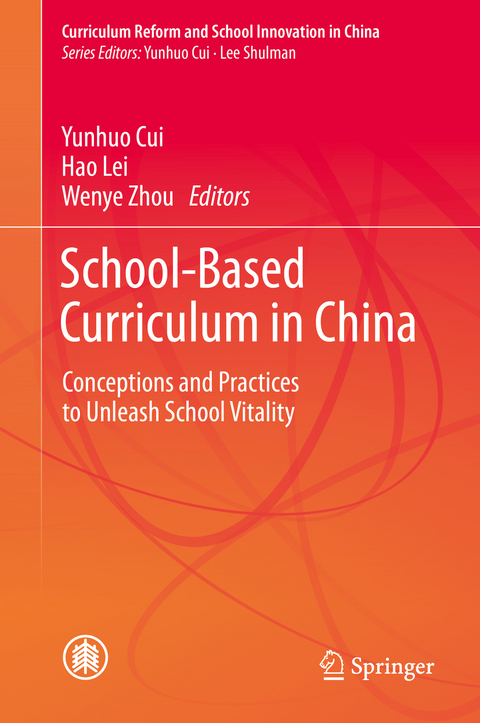
School-Based Curriculum in China
Springer Verlag, Singapore
978-981-10-8629-8 (ISBN)
The book outlines for the first time best practices in school-based curriculum development in China, i.e. how to make a holistic curriculum plan, how to design a curriculum, and how to develop a course in the context of a school-based curriculum. By discussing these three aspects, it clearly summarizes the strategies and technologies for school-based curriculum development, which are applicable across contexts.
Although the concept originated outside China, school-based curriculum development in China differs from that in other countries both in theory and practice. This book equips readers with theoretical and practical knowledge of how to develop school-based curricula and how to generate experiences for new curriculum development.
This timely book is a valuable resource for researchers, curriculum designers, school teachers and others who are interested in school-based curriculum development.
CUI Yunhuo has a PhD in Education, and is a professor and Director of the Institute of Curriculum and Instruction of East China Normal University. He is also member of the National Commission of Curriculum Reform of Basic Education in China, member of the National Commission of Teacher Training, and Vice Chairman of the Academic Committee of the Chinese Educational Society. He has published over 100 papers and books on effective teaching, curriculum evaluation, school-based curriculum development in China and school-oriented teacher professional development model curriculum studies. He won the first and second prize National Teaching Achievement Award for Basic Education. He is a leading curriculum expert, who has shaped the two major national curriculum reforms and the curriculum reform of national teacher education in China. Currently he is leading a National Breakthrough Project on philosophy and social sciences named ‘Monitoring the Quality of School Curriculum Implementation in China’. LEI Hao has a PhD in Education (East China Normal University-Purdue University Joint program supported by the National Overseas Fund), and is an associate researcher at the Institute of Curriculum and Instruction of East China Normal University. His research interests involve curriculum and instruction evaluation, teacher professional development, student learning and development. He has published more than 20 academic papers in SSCI and CSSCI journals. Currently he is a reviewer for Psychological Reports and Global Education. ZHOU Wenye has a PhD in Education (East China Normal University-University of Wisconsin-Madison Joint program supported by the National Overseas Fund), and is Associate Director of the Department of Curriculum and Instruction at East China Normal University, and associate professor at the Institute of Curriculum and Instruction of East China. She is a visiting scholar at Stanford Graduate School of Education from December 2016 to January 2018. Her research focuses on curriculum development and evaluation, classroom assessment, performance assessment, and teacher education. She is PI in two national research projects: ‘Key Competencies-based school curriculum development’ and ‘Student Performance Assessment’. She has published over 40 academic papers and books, including Theories and Techniques of Performance Assessment in School.
Part I Conceptualizations and Contexts.- Chapter 1 K-12 Curriculum Management System in China.- 1.1 Curriculum management: Theories, traditions, and trends.- 1.2 Curriculum management in China: From the centralized to the decentralized.- 1.3 Frame of three-level curriculum management: Rights and responsibilities divided among the national, regional and school levels.- Chapter 2 Localized Development of School-based Curriculum.- 2.1 School-based curriculum as teaching subjects.- 2.2 Introduction and localization of School-based curriculum as a foreign concept.- 2.3 Role of School-based Curriculum in the National Curriculum Plan.- Chapter 3 Positioning and Significance of School-based Curriculum.- 3.1 Positioning of school-based curriculum in the Primary and Junior High School Curriculum Plan.- 3.2 Positioning of school-based curriculum in the Senior High School Curriculum Plan.- 3.3 Values and significance of school-based curriculum to students, teachers and schools.- Part II Cases andBest Practices.- Chapter 4 To Design a Course under School-based Curriculum.- 4.1 Operations and procedures.- 4.2 Case I: Course of Zhoushan Sculpture.- Chapter 5 To Plan a Cluster under School-based Curriculum.- 5.1 Operations and procedures.- 5.2 Case II: TBC.- Chapter 6 To Develop a System of School-based Curriculum in a School.- 6.1 Operations and procedures.- 6.2 Case III: Affiliated Primary School to East China Science and Technology University in Shanghai.- Coda: Challenges and Prospects of School-based Curriculum in China.
| Erscheinungsdatum | 16.01.2021 |
|---|---|
| Reihe/Serie | Curriculum Reform and School Innovation in China |
| Zusatzinfo | 9 Illustrations, color; 5 Illustrations, black and white; V, 167 p. 14 illus., 9 illus. in color. |
| Verlagsort | Singapore |
| Sprache | englisch |
| Maße | 155 x 235 mm |
| Themenwelt | Geisteswissenschaften ► Psychologie ► Pädagogische Psychologie |
| Sozialwissenschaften ► Pädagogik ► Schulpädagogik / Grundschule | |
| Schlagworte | Chinese Education • curriculum development • Curriculum Leadership • Curriculum Management • curriculum planning • Curriculum reform • School-Based Curriculum • School-Based Curriculum Design • School-based Curriculum Development • School-Based Curriculum in China |
| ISBN-10 | 981-10-8629-X / 981108629X |
| ISBN-13 | 978-981-10-8629-8 / 9789811086298 |
| Zustand | Neuware |
| Haben Sie eine Frage zum Produkt? |
aus dem Bereich


